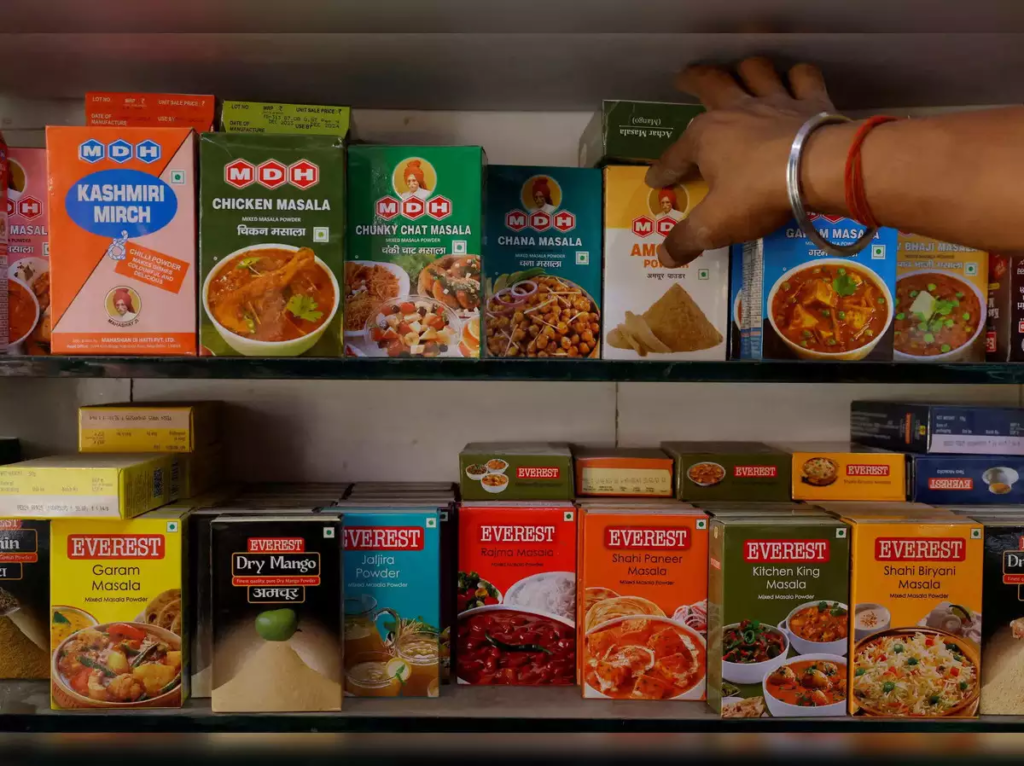
The recent concerns regarding Indian spices and spice mixes have sparked global attention, with regulators in several countries flagging contamination in well-known brands such as MDH and Everest.
Global Regulatory Flags
Between 2019 and 2024, the European Union (EU) has flagged over 400 high-quality products from India for potentially deadly contaminants, including heavy metals such as lead, mercury, and cadmium, as well as pesticides and fungicides exceeding permissible limits. Notably, 276 products received notices of border refusal, indicating the severity of the issue.
The contaminants found in Indian food products include ethylene oxide, toxic heavy metals (lead, mercury), pesticides, fungicides, and other harmful substances. For instance, ethylene oxide was detected in approximately 527 Indian products by EU countries, while lead was found in 14 various products, including turmeric powder and ayurvedic medicines. The presence of these contaminants poses significant health risks to consumers. For example, lead exposure can harm the kidneys, brain, and nervous system, while mercury can affect the neurological, digestive, and immune systems. Additionally, pesticides and fungicides exceeding permissible limits raise concerns about carcinogenic effects and other adverse health outcomes.
Several countries, including Singapore, Hong Kong, and the US, have taken action in response to the contamination issue. Hong Kong authorities withdrew four spice blends, including MDH’s ‘Madras Curry Powder’ and Everest Group’s ‘Fish Curry Masala’, due to high levels of ethylene oxide. Similarly, the Singapore Food Agency ordered the recall of Everest’s ‘Fish Curry Masala’.
Implications for Public Health:
These contaminants pose significant health risks to consumers. For example, lead exposure can harm the kidneys, brain, and nervous system, while mercury can affect the neurological, digestive, and immune systems. Additionally, pesticides and fungicides exceeding permissible limits raise concerns about carcinogenic effects and other adverse health outcomes.
India’s Response and Regulatory Oversight by Spice Board Of India
The quality concerns raised by certain countries regarding Indian spice products, the Spices Board has released comprehensive guidelines for exporters aimed at preventing ethylene oxide (EtO) contamination in shipped products.
According to the guidelines, exporters are instructed to avoid using ethylene oxide in spices as a sterilizing or fumigating agent and in any other application. Additionally, measures must be taken to ensure that transporters, storage facilities, warehouses, and suppliers of packaging materials do not use this chemical at any stage of the supply chain.
Exporters are mandated to implement measures to ensure the absence of ethylene oxide and its metabolites in spices and spice products throughout the supply chain. This includes conducting regular testing of raw materials, processing aids, packaging materials, and finished goods for EtO contamination.
Furthermore, exporters are encouraged to identify ethylene oxide as a hazard and incorporate critical control points in their Hazard Analysis Critical Control Points (HACCP) and Food Safety Plan as part of their Food Safety Management System.
In light of recent incidents where popular spice brands MDH and Everest were found to contain ethylene oxide, leading to mandatory recalls, the Spices Board’s guidelines aim to bolster the safety and integrity of Indian spice exports.
The guidelines also address other quality control measures, including the rejection of spices, herbs, and their source plants containing microbial contaminants, and precautions to prevent cross-contamination during processing and packaging.
With India’s spice exports totaling USD 4.25 billion in 2023-24, accounting for a significant share of the global spice trade, the implementation of these guidelines is crucial to maintaining India’s reputation as a reliable supplier of high-quality spices.
The Food Safety and Standards Authority of India (FSSAI) responded to the concerns by emphasizing its commitment to ensuring the safety of food products in the country. However, it noted that food products exported are outside its direct supervision. The FSSAI conducts surveillance and enforcement activities, including sampling and testing of various products, to identify non-compliant food business operators.
Members of civil society and experts have raised concerns about contamination on numerous occasions. They emphasize the need for India to review its laws and strengthen regulatory bodies like the FSSAI to ensure robust oversight of food safety standards. Experts also highlight the contamination of water sources as a contributing factor to the presence of heavy metals in food products.